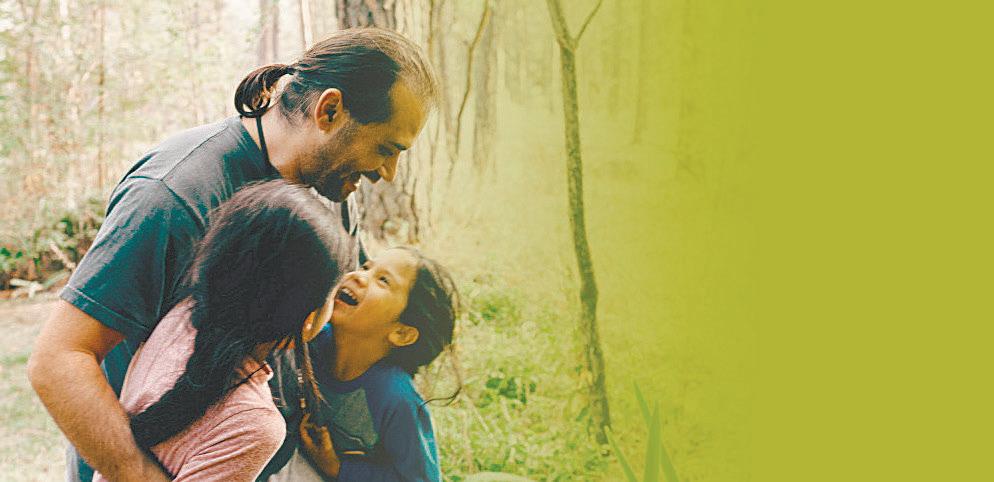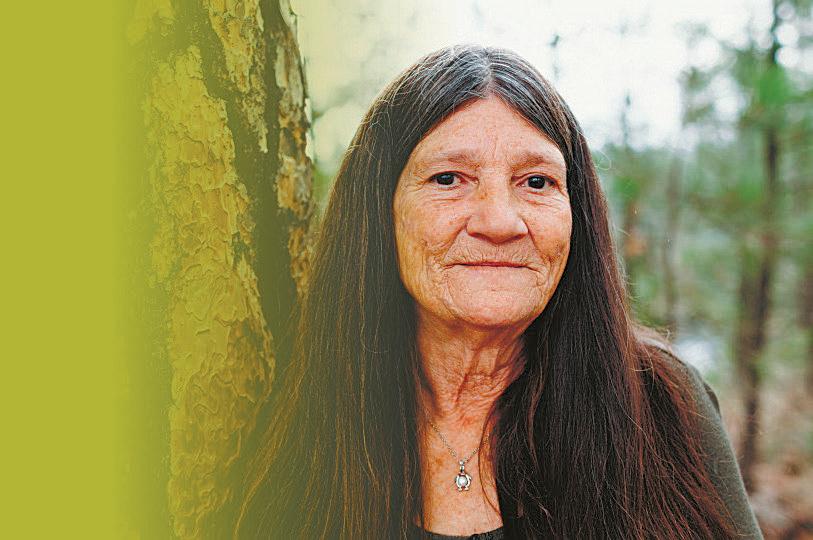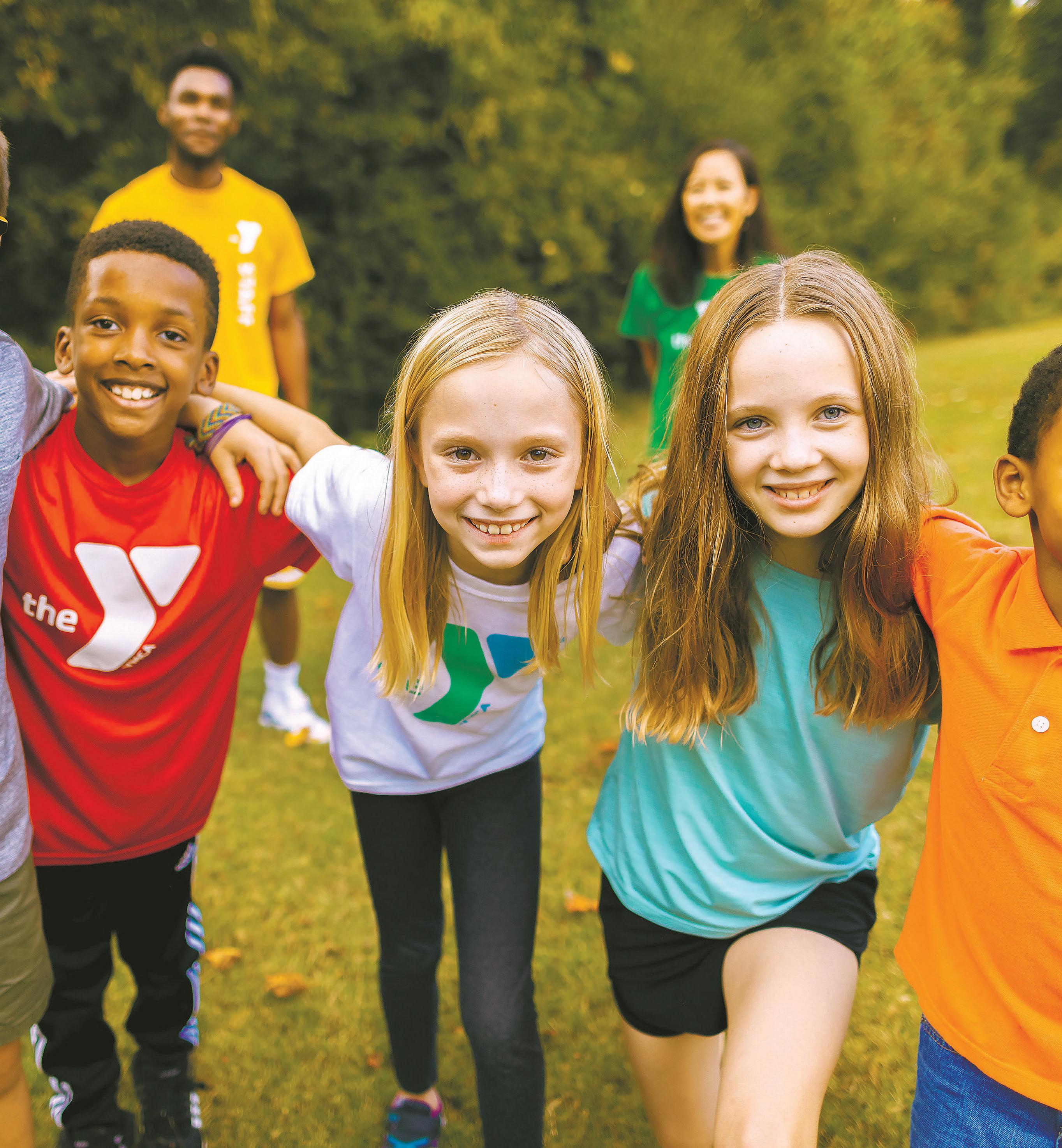










(Family Features)
Volunteering has always been a big part of Shelley Brosnan’s life, whether she was serving in her children’s school or in their Fairfax, Va., community. When Brosnan retired, increasing her volunteer efforts was a natural next step. Serving with Volunteer Fairfax, an AmeriCorps Seniors RSVP program, she spends about 10 hours a week teaching new volunteers about helping older adults age in place, providing food for those in need and extending the capacity of local nonprofits.
“There’s so much to love about volunteering,” Brosnan said. “Providing purpose and serving the community are obvious reasons, but the connections I make with others are one of the greatest
benefits. I just really love helping people and I’ve made friends through volunteering.”
Brosnan’s experience with volunteering is backed by science. According to the Mayo Clinic, having a solid social network improves both physical and mental health as it can boost happiness, increase your sense of belonging and improve selfconfidence. As people age, many social avenues from earlier phases of life, such as school and work, no longer exist and making friends can be difficult. The Mayo Clinic suggests volunteering as a beneficial way to make friends and improve social well-being.
“Volunteering fosters more connected and less isolated older adults,” said Atalaya Sergi, director at AmeriCorps
Seniors. “Our research, focused on the impact of our programs, finds volunteering can provide positive health and well-being outcomes. In our study, 84% of participants reported stable or improving health and 88% had lower feelings of isolation within one year of volunteering. Each year, we match more than 143,000 Americans with volunteer opportunities, helping build connections and address societal issues, nurturing real relationships that help people become both happier and more fulfilled.”
Adults ages 55 and up, like Brosnan, can be matched with local volunteer organizations fitting their interests, skills and availability through AmeriCorps Seniors, the nation’s largest national service program for older

“There is always a way out.”
By Debra, a formerly homeless addict
If I could speak to myself back when I was in my addiction, I’d say, “Don’t give up on yourself. Even though you don’t think you can change, you can.”
My upbringing was rough. People always said I was so ugly I’d die alone. At 17, I decided I wanted a man in my life and was willing to take what I could get, so I put an ad in the paper and met this 45-year-old man. He started buying me alcohol which became my first addiction. Things went from bad to worse. In a few short years, I became like every single human I’d ever judged. I was homeless, addicted to meth, and I started doing things I’ll regret the rest of my life.
Eventually, I decided I’d had enough of the street life. I tried some outpatient programs, but I kept relapsing, so in 2019, I went to Union Gospel Mission for their 18-month LIFE Recovery program.
The program helped me define who I really wanted to be and gave me steps to become that person.
What I want to say to anyone feeling stuck is that, “There is always a way out. Just take the first step and reach out to someone or a program that can help you. Help really is out there.”

adults, which offers three signature programs. Brosnan and other volunteers nationwide play crucial roles in community resilience and connectedness.
“RSVP volunteers, such as Shelley, take on diverse activities based on community need such as delivering meals, supporting veterans and military families, cleaning parks or helping with tax prep and financial literacy,” Sergi said. “Our Foster Grandparent Program pairs volunteers with youth, in mentoring and tutoring relationships. Lastly, the Senior Companion Program is a way to give a helping hand to other older adults and those with disabilities, assisting them with day-today tasks, such as grocery shopping and transportation to appointments. They also support caregivers through respite services.”
The time commitment for all programs is flexible, ranging from a few hours to 40 hours per week.
Research studies like the Harvard University Study of Adult Development, found that older adults who invest in, care for and develop the next generation are three times as likely to be happy as those who did not. Volunteers Francois Mwabi and Jerome Menyo, based in Kentwood, Mich., are two more examples of the difference it can make to serve.
Mwabi and Menyo attest to the joy of impacting youth by passing on their wisdom and sharing their culture and language with students, many


of whom are refugees from different parts of Africa just as Mwabi and Menyo themselves were several years ago. The two volunteers are so popular among the students and staff that teachers had to work out a schedule for all their students to be able to spend time with them.
One of the reasons the program has such a positive impact is the intergenerational connections it helps establish. Benefits abound not only for the young, but particularly for the volunteers.
“We love being here because of the environment and the students who study here,” Menyo said. “The teachers like us. I help students who speak my language. I enjoy it and they enjoy it, too.”
Intragenerational pairings are fruitful and fulfilling, as well.
Masa Hunley of Philadelphia eagerly anticipates the time she spends with Deborah Washington, a Senior Companion Program volunteer. Washington, a retired mail carrier with the U.S. Postal Service, was active before retirement and saw no reason to
slow down after leaving full-time work. She was paired with Hunley three years ago.
Washington thinks of Hunley warmly, “almost as a grandma.” She spends a few hours twice a week with Hunley, helping her with meal prep, getting to appointments, watching television or playing cards together.
Serving as a companion to Hunley is “just something that I enjoy doing, as if it was my mom or my grandmom, who have both passed,” Washington said. “It’s like serving them and praying that, if it was my mom or my grandmom, someone would be doing the same thing. It has to be in your heart.”
Washington is also thankful for the opportunity Hunley provides for “loving up on her” and feels fortunate to be able to soak up the wisdom that Hunley has learned and earned.
To be matched to rewarding volunteer opportunities near you, visit AmeriCorps.gov/YourMoment.


The Christmas Bureau is celebrating 78 years of providing holiday assistance to those in need in the greater Spokane area.










Christ Kitchen is celebrating 25 years of providing hope to impoverished women in Spokane, providing more than 800,000 hours of job training for women re-entering the work force after facing homelessness, substance abuse, domestic violence, prison, and other barriers to employment.
Christ Kitchen teaches job skills in: Commercial Baking, Culinary, Barista, Catering, Food Truck Management, Horticulture/Gardening, Office Administration, Retail/Wholesale, and Customer Service/ Marketing. It has a 96% retention rate among their graduates; and in 82 percent of cases, mothers are reunited with children who have been placed in the foster care system.
Christ Kitchen offers a café, coffee bar, catering, and retail store. It is open 10 a.m.-5 p.m. Monday-Friday at 2410 N. Monroe. Dried products can also be purchased at Rosauers, Yoke’s Fresh Market, My Fresh Basket, Huckleberry’s, and at other locations around Spokane. Products can also be purchased online at www. christkitchen.org, or at River Park Square during the month of December.
Holy Cross Funeral and Cemetery Services, long known for its three beautiful cemeteries: Holy Cross, St. Joseph, and Queen of Peace, now includes the new state-of-the-art Holy Cross Funeral Home located at 7111 N. Division Street, a nonprofit facility and haven of comfort for families. The funeral home offers comprehensive services, including on-site cremation and preparation, ensuring that all aspects of the funeral process are handled with care and respect. Built on consecrated ground, Holy Cross is more than a funeral home: it’s a sacred place. In 2024, Holy Cross Funeral and Cemetery Services was selected winner of the Washington State Cemetery of the Year Award at the Washington State Death Professionals Convention. The winner of this prestigious award is chosen from all cemeteries, nonprofit or for profit, in the state in appreciation and recognition of outstanding service, and exceptional contributions and commitment to the funeral service profession.

Feed the Hungry, Heal the Hurting and Welcome the Stranger encompasses all the ways we serve our community members in need. Along with our mission, we incorporate our core values of Compassion, Collaboration, Respect and Justice as we interact with individuals and families who come to us seeking assistance.
Rooted in this mission is our legacy of service to our most vulnerable neighbors, regardless of their religious affiliation. The goal of our work throughout Eastern Washington is to continually build a foundation of stability, health and hope.
The dedicated staff at our 15 mission-centered programs meet with clients where they are, providing the necessary tools for them to be fed, healed and feel welcomed.
We invite you to get involved and support us through volunteering or donating to our mission.
Please visit www.cceasternwa.org to find out more.


(Family Features) Tom Thousand spent many years helping low-income residents with home repairs. After retirement, he knew he wanted to continue helping people in his free time.
He answered the call to serve through AmeriCorps Seniors RSVP. Since 2010, he has volunteered to deliver meals to those in need, transported donated food to food pantries and captained boats on a nearby lake for group trips. Thousand was there when his neighbors needed rides to medical appointments and the Red Cross needed help delivering blood in his community.
All across the country, AmeriCorps Seniors connects people aged 55 and older with opportunities to volunteer in their communities. The program matches each volunteer’s interests and skills with local non-profit organizations. More than 140,000 older Americans serve their communities yearly through three core programs – the RSVP Program, the Foster Grandparent Program and the Senior Companion Program.
Many older adults look for variety, flexibility and benefits when searching for a way to volunteer.
“Since it was established in 1971, our RSVP program has been one of the nation’s largest older adult volunteer programs,” said Atalaya Sergi, national director, AmeriCorps Seniors. “The program has a wide variety of service opportunities that allow volunteers to help address our nation’s most pressing challenges.
For our volunteers, RSVP takes the guesswork out of choosing how and where to volunteer their time and energy.”
Opportunities vary by city and state, but the RSVP program offers volunteers diverse ways to serve through local organizations. Examples include packaging meals for people with disabilities or other older adults, working in a call center for fraud victims, coordinating poetry workshops at a community center to stimulate the minds of those participating or transporting cancer patients to medical appointments. Service
could also involve workforce development and job training or providing disaster preparedness assistance.
There are even select programs specifically designed to support veterans.
Mark Piscatelli volunteers at veterans’ coffeehouses. Coordinated through his local AmeriCorps Seniors RSVP program, the coffeehouses allow veterans to gather and socialize with each other and with volunteers. The social setting creates a safe space, fostering community and stability for everyone involved. Guest speakers frequently visit and provide new and updated information to attendees on local and national veterans’ services.
“AmeriCorps Seniors has created a wonderful opportunity for me to learn about veterans, veterans’ issues, what they’ve experienced, what they currently experience and what some of their concerns are going forward,” Piscatelli said.

David Langlois, a fellow volunteer, concurs.
“I really think that the bottom line is to support our veterans,” he said.
Older adults need volunteer programs that fit their lifestyles and allow them to choose how, where and the frequency of their service. Commitments range from a few hours to 40 hours per week. This flexibility allows Piscatelli and his fellow volunteers to participate without feeling overwhelmed by time obligations.
Volunteering is more than a way to fill time, however. Research from sources such as the National Institute on Aging suggests that older adults who are engaged in social and community activities maintain mental and physical health longer than those who are not.
“After one year of service, 88% of our volunteers reported a decrease in feelings of isolation,” Sergi said. “Plus, 78% of volunteers felt less depressed. That
uplifts spirits and significantly impacts and benefits people’s lives.”
Yolanda Dave is an example of the positive impact of volunteering on the community and the volunteers themselves. She started volunteering more than 20 years ago because helping her community with hunger, isolation and literacy issues empowered her to be part of the solution. It’s more than that, though. She also benefits from the experience.
“I love volunteering,” Dave said. “You meet wonderful people of all ages. I get to share my skills, my experience. It keeps me active, mentally and physically, which is very healthy.”
Volunteers like Thousand, Piscatelli, Langlois and Dave support people in need and strengthen their communities and neighborhoods. If you’re 55 or older and looking for the right volunteer opportunity, visit AmeriCorps. gov/YourMoment to explore opportunities near you.

When students struggle in high school, many administrators jump to conclusions: they’re unmotivated, they don’t learn well in a classroom, or school is just “not for them.”
Our team at Treehouse knows this isn’t the case, especially for youth in foster care. The students we support rarely lack the motivation, intelligence, or the ability to learn; instead, they lack the right support and resources at the right time to make their high school experiences successful.
In Spokane, the Treehouse team regularly reports wins that back up our view: a student who experienced a rough transition into high school raised his GPA nearly a full point, and another student who failed two classes and was previously suspended is now passing all their classes.
These successes aren’t anomalies. Youth in foster care can thrive in high school, despite the increased instability and trauma they often face. Our Graduation Success program works with youth, pairing them with a Treehouse Education Specialist who provides educational support and connection to resources when students need them.
It is easier to assume that students are unmotivated or cannot learn than to explore why youth in foster care do not graduate at the same rate as their peers. The right course of action is to listen to youth and let them define what they need. This is what Treehouse does—and it works. In the past five years alone, over 180 students in Treehouse programs in Spokane have completed high school with a plan for the future.










Many people associate the YMCA with a swimming pool, treadmills, or even a place to socialize and make friends. But the true power of the Y isn’t found within our four walls. The Y is in the hearts and actions of every neighbor who believes in our vision of a better “us” and a stronger community for all. Thanks to the support of neighbors like you, each year the YMCA:
• Provides over 600,000 meals and snacks to children to help eliminate food insecurity and hunger for our local youth.
• Teaches over 1,500 children essential, life-saving skills through our Safety Around Water program and swim lessons.
• Provides over $2.5 million in subsidized memberships to seniors who are on fixed incomes.
• Helps over 5,000 kids learn the value of teamwork and sportsmanship through our youth sports leagues and clinics.
• Serves 900 children in youth summer camp so they can learn, grow and thrive while their parents are at work.
• Cares for over 800 school-aged children in our afterschool enrichment programs.
• Prepares 200+ children for kindergarten through our early learning program and its focus on hands-on learning and social and emotional development. No one is ever turned away from the Y due to an inability to pay. Our generous donors ensure that everyone has access to the same quality programming, regardless of their financial status. Your gift today ensures that the YMCA can continue to serve everyone in our community.


Since 1988, Women & Children’s Free Restaurant & Community Kitchen has been a vital safety net that fills nutritional gaps for women and children in need while fostering dignity and respect, both within our restaurant and in the community.
Women & Children’s Free Restaurant’s mission stems from the belief that access to not just food but healthy food is a basic human right. WCFR serves women, children, seniors, and teens who struggle with nutrition security and poverty stemming from various root
causes. The restaurant, now in its 36th year, has won the AGORA award for nonprofit excellence twice and achieved GuideStar’s Platinum status. In March 2020, the restaurant made a transformative shift to address the community’s growing need for nutritional support. Since then, we have provided more than 4.5 million meals to local women and children. The restaurant has garnered this level of support by providing fully prepared meals and a variety of fresh and shelfstable groceries. Fresh protein, dairy, and produce take center stage at each food distribution event.
Safety, dignity, self-sufficiency, and mutual respect are vital components of WCFR’s services. Commitment to helping create a vibrant and robust community is at the center of everything they do. Food insecurity is defined as having unreliable access to a sufficient quantity of affordable, nutritious food. This problem affects at least 75,000 people—15% of our residents in Spokane County.
WCFR also prepares nutritious meals for organizations throughout our community, working collaboratively with agencies providing shelter,
domestic violence assistance, childcare and protection, and LGBTQ+ support. These unique partnerships connect Spokane County’s most vulnerable citizens with basic needs and healthy options for improved quality of life.
As grateful stewards of the community’s generosity, WCFR asks for your support. Every dollar makes a difference, and every hour of your time represents a nonrenewable gift of lasting impact. If you can make a financial gift, please do so with the confidence that you are supporting a Platinumlevel organization. If you have the gift of time, please join the restaurant’s volunteer workforce—a fantastic group of people who are the lifeblood of WCFR. Let’s work together to solve hunger in our community.
DONATE at wcfrspokane.org/donation
VOLUNTEER at wcfrspokane. org/volunteer-openings/
Follow us on Facebook and Instagram. FB: @WCFRSpokane IG: @wcfr.spokane

